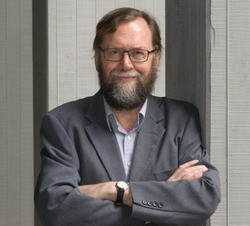The Kiwi researcher who pioneered the use of mild cooling to treat babies with brain injuries at birth has been awarded the Health Research Council (HRC) Beaven Medal at the Royal Society Te Apārangi’s New Zealand Research Honours in Auckland this evening.
University of Auckland Professor of Paediatrics and Physiology, Alistair Gunn, was the first to show that even very delayed cooling could reduce brain injury in large animals around the time of birth, and to systematically work out how and when cooling needed to be applied to protect a newborn baby’s brain from damage.
HRC Chief Executive Professor Kath McPherson presented Professor Gunn with the Beaven Medal for excellence in translational research. She said his world-first study and subsequent clinical trials meant that mild cooling was now the standard of care for treating babies with brain injury due to low oxygen levels in New Zealand and around the world.
“Alistair’s research, which the HRC is proud to have supported for more than 25 years, has proven that treatment of babies with brain injury using mild cooling is extremely cheap, effective, practical, and safe. Current head cooling treatment protocols increase survival of those babies without disability and significantly reduce the rate of the most severe complications, such as cerebral palsy, by about 12 per cent,” said Professor McPherson.
At least 1 million babies worldwide die or survive with disability from lack of oxygen to the brain at birth, a condition known as hypoxic-ischemic encephalopathy. In New Zealand, it’s estimated that between 50 and 70 babies have moderate to severe brain injury at birth because of this.
Professor McPherson said the cooling treatment that Alistair and his team have developed and modified has reduced the number of children with cerebral palsy due to birth complications in New Zealand by six to eight per year, saving an estimated $230 million to $385 million in lifetime costs each year.
“It’s really important to stress that this estimate only relates to the most severe outcomes. It doesn’t include the enormous impact of this treatment on the lives of the children and their families, the reduction in milder disabilities, or the emerging international evidence that even for those children who survive with disability, the severity of their cerebral palsy has been reduced,” said Professor McPherson.
Professor Gunn said therapeutic hypothermia is a triumph for pragmatic Kiwi science.
“This award recognises the efforts not just of our team but also our many friends and collaborators in New Zealand and around the world, over several decades, to bring it from an interesting observation to everyday use,” said Professor Gunn.
“I’m particularly grateful to the families who let their babies take part in the first randomised trials at a time when deliberately cooling babies was still a radical suggestion, and for the generous and consistent support of the Health Research Council of New Zealand from the very start. Finally, I’d like to acknowledge the Auckland Medical Research Foundation who supported our first cooling machine.”
Professor Gunn and his long-time collaborator at the University of Auckland, Professor Laura Bennet, are currently leading a $4.9 million HRC-funded study to fine-tune current head cooling treatment protocols, and promote long-term recovery of brain function in those babies for whom the treatment ‘window of opportunity’ has passed.
Background information on Professor Alistair Gunn’s research
- Professor Alistair Gunn and his team developed therapeutic hypothermia (cooling) as the first treatment to significantly improve survival without any disability for babies affected by lack of oxygen to the brain at birth.
- Cooling works by suppressing cell death pathways activated by injury. The earlier the cooling treatment is applied, the better – ideally, within 6 hours of the brain injury.
- With the late Professor Tania Gunn, Alistair completed the first ever randomised pilot study of head cooling in babies with birth injury.
- Based on this study, Alistair then designed and led the CoolCap study, a major international multicentre trial of head cooling for treating low oxygen at birth involving 25 sites in New Zealand, UK, USA, and Canada.
- The CoolCap study showed that cooling could improve survival without disability in all but the most severely affected babies.
- Alistair is currently leading a HRC-funded programme ($4.9 million) to assess leading strategies to augment cooling brain protection after low oxygen at birth and promote long-term recovery of brain function. This programme will include examining whether treatments that alleviate chronic brain inflammation can also help restore brain growth.
